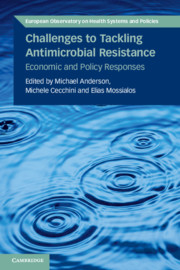Figures
1.1Percentage of invasive isolates tested resistant to selected antibiotics for Escherichia coli and Klebsiella pneumoniae reported from European countries in 2017
1.2Cross country comparison of patterns of Escherichia coli and Klebsiella pneumoniae resistant to third-generation cephalosporins
2.1Relative risk of 30-day mortality of patients with resistant infections relative to those with susceptible infections
2.2Cost of hospitalization for patients with Escherichia coli antibiotic-resistant infection and underlying drivers
2.3Projected working-age population loss in OECD countries per year relative to 0% resistance, 2020–2050
4.1Relationship between the number of hospital-acquired infections and investments in infection control
5.1Summary of the pathways of transmission of resistant bacteria between animals, humans and the environment
5.2Different routes for exchange of resistant bacteria or genes from animals to humans and vice versa
6.1Number of new classes of antibiotic discovered or patented each decade
6.2The number of antibiotics in clinical development possibly active against WHO PPL pathogens (2017) and the number of alternative therapies to antibiotics in clinical development (2017)
6.3Framework for developing a holistic incentive package for antibiotic development
6.4Continuum of incentivization across the antibiotic value chain
8.1Ways in which vaccines may reduce antimicrobial resistance
9.1Systems diagram of the challenge of antimicrobial resistance
9.2“A Fair Shot” pictograph by the Médecins sans Frontières Access Campaign
9.3Dutch Minister of Health, Welfare and Sport, Edith Schippers, poses for photo with US Public Interest Research Group at 2016 UN General Assembly
9.4Book on microbes by children for children from ReAct Latin America



